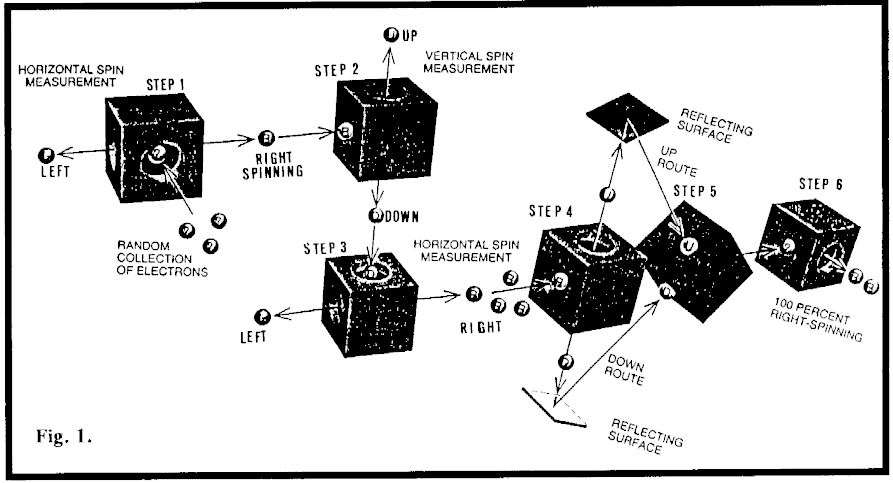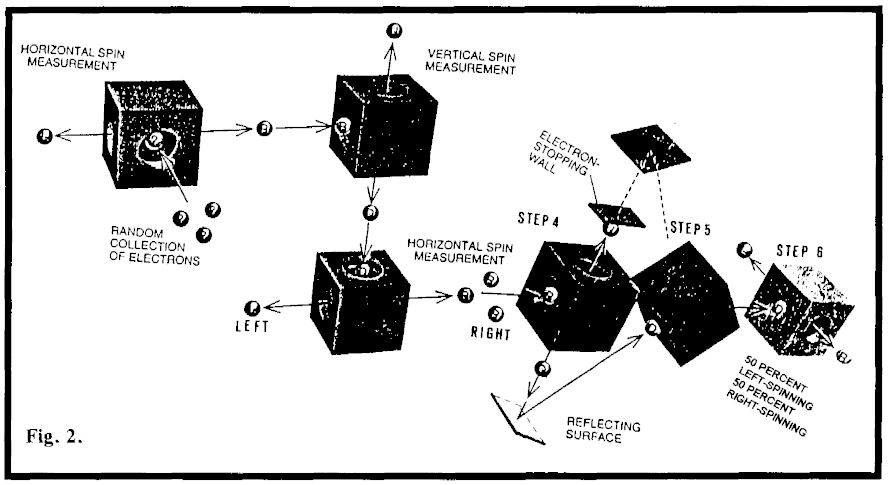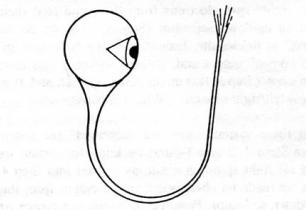© 1997 Ken Glasziou
© 1997 The Brotherhood of Man Library
Has it what? Has quantum physics demonstrated the Universal Father? Well no—that is beyond the capabilities of science. But after a lifetime spent in investigating the mysteries of quantum effects, truly great physicists like Heisenberg and Pauli have expressed their belief that the existence of “a central order of things” is indisputable, and Heisenberg has opted for identifying the “central order” with his personal God.

What quantum physics has done is to provide hard experimental evidence that, in a quantum event, the conscious mind of an observer co-ordinates with some strange information processing and guidance system that can act instantaneously and independently of time and space. That this is so is beautifully demonstrated in an experiment previously described in Innerface Vol. 2 (1) and illustrated in Figs. 1 and 2 of that article. A brief outline of this work follows:
Electrons have spin that can be resolved into up or down vertical components and left or right horizontal components. Physicists have magic boxes for separating these spin components. For the box shown in “A” of a make-shift combined Fig. 1 and 2, electrons can be fed into it and separated into those that are “left spinning” or those that are “right” spinning. If we take the “right” spinning electrons and feed them into an up/down separator the Heisenberg Uncertainty principle hits us right between the eyes.
For correlated properties, if we know all about one of them, then the Uncertainty Principle says we can know nothing about the other. That’s a rule from the “Central Order.” The act of observing what comes from the up/down separator means we know whether they have “up” or “down” spin. In learning this, the “Central Order” randomizes the left/right spin.
To discover more about rules from the “Central Order,” take “right” spin electrons (B) and feed them into an up/down separator—but we do not “look” at the results. Instead, we take both the “up” and “down” streams and, without looking, feed them into a mixing box, and then into a left/right separator. What happens?
In these various steps, we knew for certain we fed all right spinning electrons into the up/down separator of “B.” But we made no observation on the output from this up/down separator. From our previous experience we know that if we had done so, the act of observing the up/down output would have destroyed our knowledge about left and right spin. At this stage, the certain knowledge we have from an actual observation is that right spinning electrons went into the up/down separator, then into the mixer. If the up/down separator randomized the right spin we should get 50% left and 50% right spin when we put them through a left/right separator. However, when we looked, we found we had all right spinning electrons!

To find out more about the rules from the Central Order, we played another card. Everything was the same up to the output of the up/down separator. Here the output of the “up” stream was blocked so only “down” electrons went into the mixer.
We already know that if we were to feed “down” electrons into a left/right separator, the down spin would get randomized. We also know from the Uncertainty Principle that if we know that we have all “down” spin electrons, we are not permitted to know anything about their left/ right spin.
In this case, the Central Order has decreed that blocking the output of the “up” stream of of the “up” stream is the equivalent of an observation. It says we know only “down” electrons have been put into the mixer. So this time, what happens?
When we looked putting these “down” spin electrons through the left/right separator gave 50 % left and 50 % right spin instead of all right spinning electrons!
If we take some time to think about the quite extraordinary results from this experiment, we see three things.
- First, the observer is an integral part of the system whose conscious choice affects results of what “matter” is doing.
- Second, there is a “Central Order” that is orderly and knows its own rules.
- Third, the uncertainty of the Uncertainty Principle does not depend on the act of measuring one of the correlated properties that physically affects the measurement of the other. Uncertainty is an absolute rule.
Science probably cannot go further than to provide us with the evidence like this demonstrating the operation of a “Central Order of Things or Events” that is much more than a static set of rules. It bears the mark of conscious participation with the minds of observers such as ourselves in deciding the outcome of universe events.
This information, garnered laboriously by quantum physicists over a 100 year period constitutes a revolution for science, philosophy, and religion—if we will but take notice. There is no room left for determinism, materialism, and clockwork universes.
An alternative, idealist concept of reality posits:
- Ideas, and the consciousness of them, is the basic reality.
- Everything exists in and is manipulated from an apparently transcendent consciousness—the Central Order, the Ground of all Being.
- In this grand order, there is room for you and me.
The Urantia Book has a lot to say about transcendent reality. But, in fact, it appears to indicate that the course of these finite events is decided not at the transcendent level but at the level of an experiential deity, the Supreme Being.

¶ Further Reading
- Albert, David Z. “Bohm’s Alternative to Quantum Mechanics” Scientific American 1994 279 (5) 32.
- Chalmers, David J., “The Conscious Mind.” (Oxford University Press, 1996)
- Chiao, R.Y., Kwiat, P.G., & Steinberg, A.M., “Faster than Light.” (Scientific American 269 (2) 1993)
- Davies, P. & Gribbin, J., “The Matter Myth.” (Simon and Schuster, Ltd., N.Y. 1992)
- Goswami, A., “The Self-Aware Universe.” (Simon & Schuster, Ltd., London. 1993)
- Johnson, G., “Fire in the Mind.” (Viking, London. 1996)
- Penrose, R., “Shadows of the Mind.” (Oxford University Press, 1996)